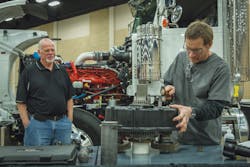Characteristically, maintenance managers attempt to reduce all maintenance activities into instructions to follow. There is one category of activity, though, that cannot be done well by following a process, procedure or protocol.
In many areas, like job planning, preventive maintenance (PM) or simple troubleshooting, we are successful in creating instructions for completing such tasks. But there are many instances where more is required than following the particular instructions to step through the progression to accomplish a repair and bring an asset back to good condition. Technicians need knowledge, skill, training and awareness.
The problem is, with processes, procedures and protocols, we are not teaching people to think.
Loss of Knowledge
The superstructure of maintenance has been collapsing for a decade or so and is becoming less visible. The collapse is caused by the retirement of the baby boomers.
The last boomer was born in 1964 and will reach full retirement age – 67 – in 2031. In five years, the whole lot will be retired.
There has been a lot of talk about the loss of knowledge and skills that goes away when these folks leave. However, I think this is less important than another loss because knowledge and skills are more easily replaced. This other loss is much less visible and potentially much more expensive.
Mentorship
What does it take to gain mastery of a craft? Sure, there is knowledge, experience and skills, but mastery requires more. All three aforementioned competencies, can be gained by an individual. But mastery becomes much quicker and more certain if there is a highly experienced person available to help. This person is a mentor and what mentors provide is intangible.
Certainly, a master craftsperson passes on skills and knowledge. But, the craft master’s attitude is the secret sauce. This attitude involves where to mentally stand while solving a problem. It’s about having a special kind of attention and being acutely focused on what a piece of equipment is “saying” – having the ability to commune with the machine about its condition.
A mentor models all this and shares it, teaching less experienced or less knowledgeable technicians about not jumping to conclusions and being aware of the sounds, smells and sights of the machine. Mentors offer lessons learned and advice gained through their experiences.
They explain that mistakes help a person learn and develop. Moreover, mentors are available to just listen.
If you are on the youthful side of the divide, then a mentor can be useful for your career and accelerate your assention to mastery. If you are on the far side of the divide, then mentoring can add a tremendous amount of satisfaction to your job and role.
The book, Shop Class as Soulcraft: An Inquiry into the Value of Work by Matthew B. Crawford, is a worthwhile read for more thoughts on mentoring and knowledge loss in the trades.
Joel Levitt is director of international projects for Life Cycle Engineering (www.lce.com), an organization that provides consulting, engineering, applied technology and education solutions that deliver lasting results. Previously, he was president of Springfield Resources (www.maintenancetraining.com), a management consulting firm.
About the Author

Joel Levitt
President, Springfield Resources
Joel Levitt has trained more than 17,000 maintenance leaders from more than 3,000 organizations in 24 countries. He is the president of Springfield Resources, a management consulting firm that services a variety of clients on a wide range of maintenance issues www.maintenancetraining.com. He is also the designer of Laser-Focused Training, a flexible training program that provides specific targeted training on your schedule, online to one to 250 people in maintenance management, asset management and reliability.
